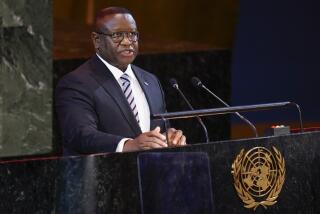Background: Sierra Leone
- Share via
Sierra Leone, which won its independence from Britain in 1961, has experienced a long decline marked by coups, contested elections and poverty.
In 1985, army commander Maj. Gen. Joseph Momoh came to power, and the country slid into a social hell of interminable fuel lines, food shortages and corruption that diverted profits from 90% of its diamond production.
The civil war, from which the current shaky peace deal stems, began in the early 1990s. The government found itself challenged by the Revolutionary United Front, or RUF, a group of dissidents in league with rebel forces in neighboring Liberia.
The long war left at least 50,000 people dead and displaced 1.5 million. Peacekeepers from neighboring nations were deployed to help bring some sense of order.
In 1992, the failure to feed or pay soldiers and junior officers sparked a rebellion. Nine junior officers led a convoy into the capital, Freetown, to demand their pay at gunpoint. Already unpopular, Momoh fled the country.
A charismatic army captain, Valentine Strasser, was chosen to lead a provisional military government. In late 1993, Strasser announced a transitional program that provided for the installation of a civilian government by January 1996. Instead, that target date brought another coup, ousting Strasser.
National balloting in March 1996 led to the election of Ahmad Tejan Kabbah as president. By May 1997, however, dissident members of the armed forces, led by Lt. Col. Johnny Paul Koroma, seized power. Kabbah fled to Guinea.
Koroma invited RUF rebels led by Foday Sankoh to join the military in ruling Sierra Leone. The rebel-military partnership lasted less than a year.
In March 1998, the Nigerian-led peacekeepers restored Kabbah to power. But the RUF rebels continued their campaign.
A cease-fire was signed between Kabbah’s government and the RUF in April 1999, followed in July by the peace pact that collapsed this month.
More to Read
Sign up for Essential California
The most important California stories and recommendations in your inbox every morning.
You may occasionally receive promotional content from the Los Angeles Times.










